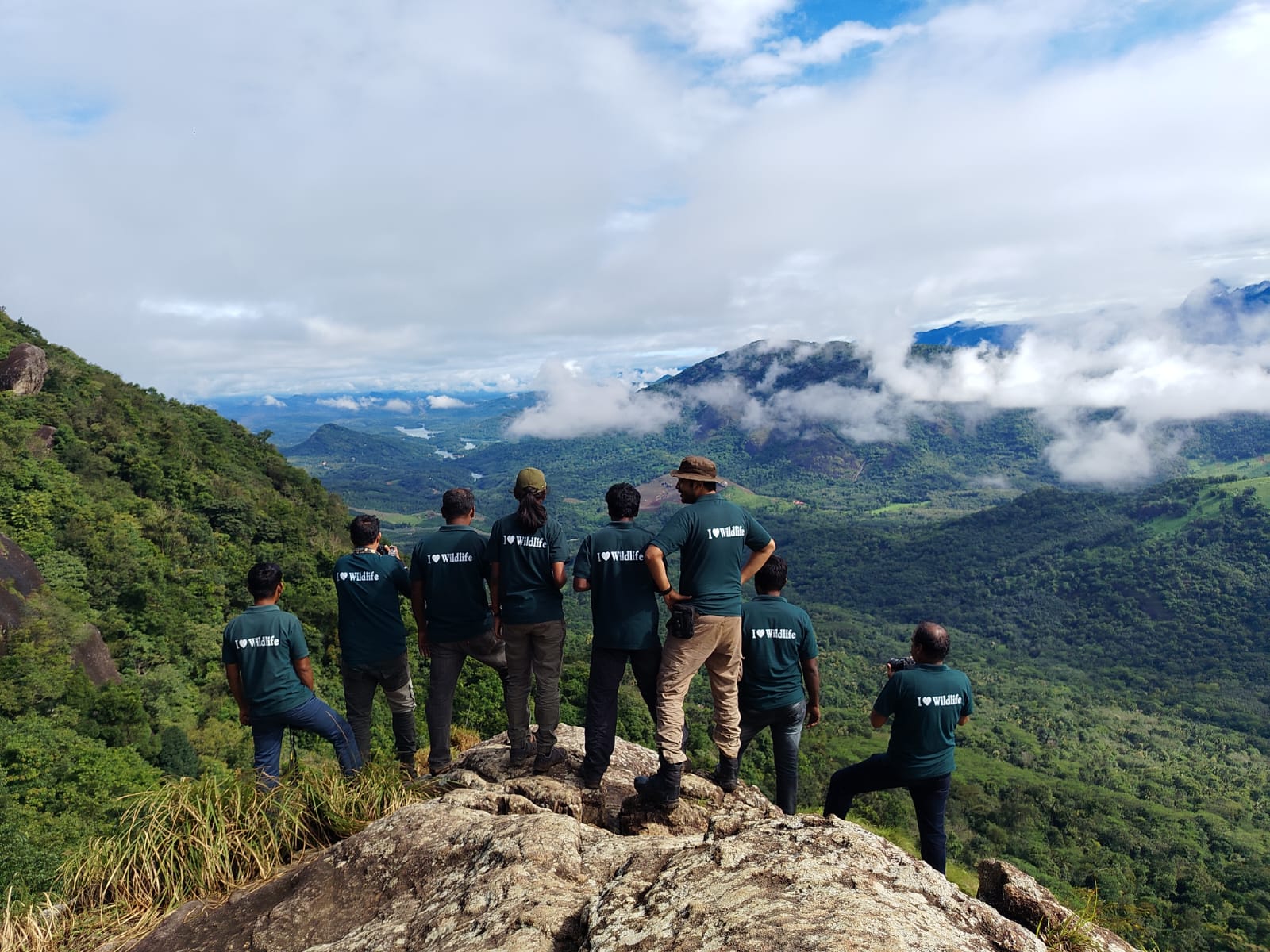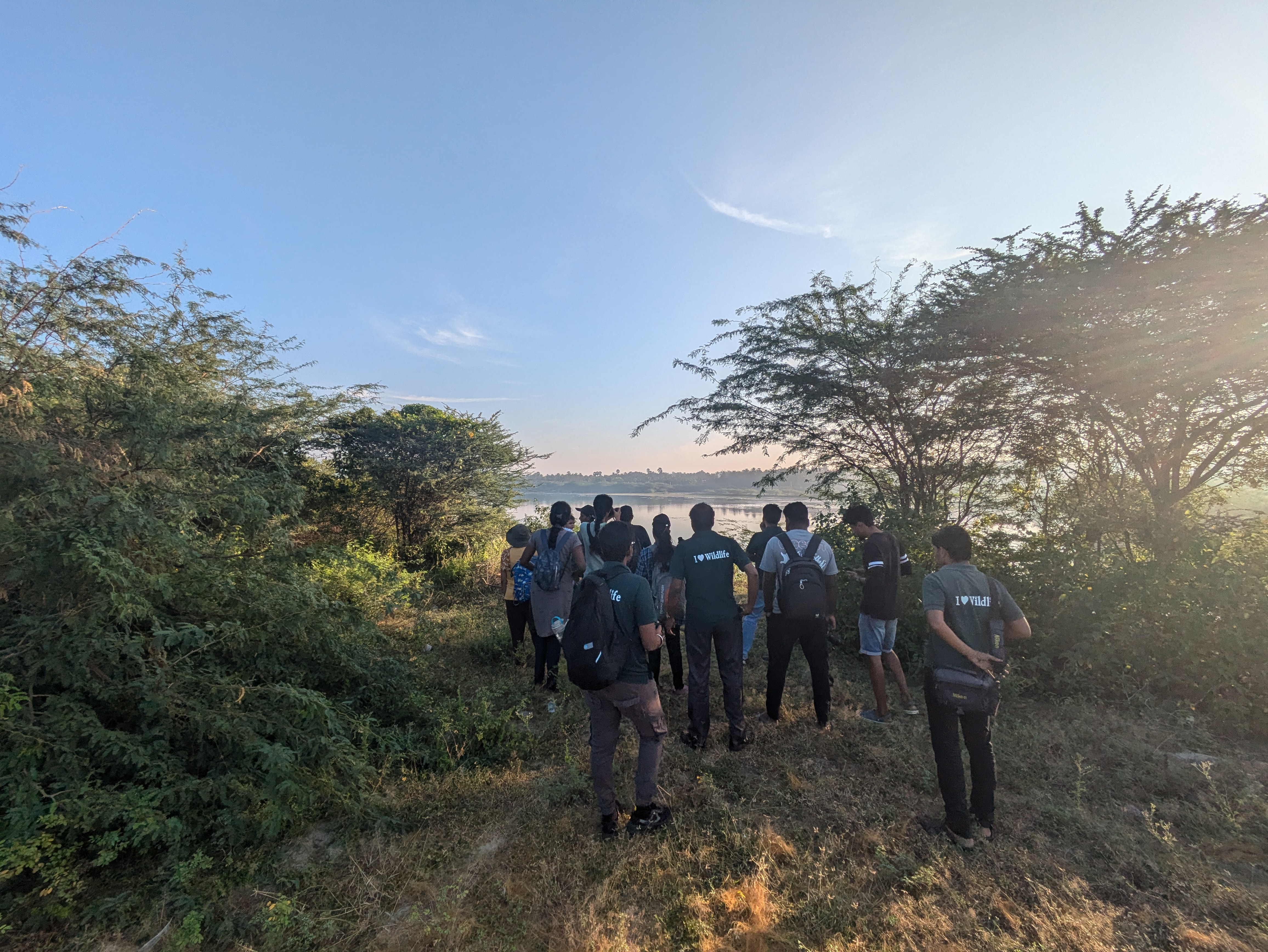
The Kanyakumari Nature Foundation (KNF) recently provided an enriching internship experience for four postgraduate students, offering them an opportunity to engage with diverse ecosystems and conservation activities. Over the course of their internship, the students were exposed to a variety of hands-on experiences, from forest restoration to birdwatching and marine ecology.
Day 1: A Journey Through the Forest
The internship began with an immersive field visit to the Kaliyal Forest Division, where the students started their day with an early morning birdwatching session. As they observed the rich avian diversity, they learned to identify different bird species and understand their ecological roles.
Following this, they actively participated in eco-camp activities where they engaged with students in nature walks and interactive environmental awareness sessions. These activities aimed to instill a sense of appreciation for nature among young learners.
Later in the day, the team visited an ecological restoration site where KNF has been working to rehabilitate degraded forest areas. Here, they were introduced to the invasive creeper Mucuna bracteata and its ecological impact on local biodiversity. The students gained insights into the challenges of habitat restoration and the importance of maintaining a balanced ecosystem.
On their way back, they were fortunate to witness a large herd of Indian Gaur—a thrilling sighting that added to their growing appreciation of wildlife.

Day 2: Exploring Coastal Bird Habitats and Technology
The second day of the internship took them to Puthalam, a well-known birding hotspot in Kanniyakumari district. The day began with birdwatching at the saltpans, where the students observed a fascinating variety of shorebirds and waterbirds. They learned about bird migration patterns, seasonal visitors, and the importance of wetlands as crucial habitats for avian species.
In the evening, the students participated in a hands-on session on drone operations and wildlife photography. The session also covered essential techniques in wildlife photography, helping them document their experiences more effectively.

Day 3: Wetland Ecology and Marine Life Exploration
On the third day, the team visited several wetlands in Kanniyakumari district, where they studied the ecological significance of these water bodies. They explored how wetlands support biodiversity, act as natural water filters, and provide habitat for numerous species.
In the afternoon, they attended a session on online data management, which highlighted the importance of digital tools in conservation research. They learned how field data is collected, analyzed, and stored for future reference, contributing to long-term ecological studies.
The day was concluded with a visit to the coastal region of Kanniyakumari, where the students engaged in a learning session on marine biodiversity. They explored the unique coastal ecosystem, gaining knowledge about the diverse marine life found in the region.

Day 4: Cattle population assessment
The following day, the interns embarked on an early morning birdwatching session at Perunchani Dam, observing the rich avian diversity in the region. Following this, they visited several villages in the vicinity, where they conducted a cattle population survey, collecting data on the number of cattle in each household. This assessment would play a crucial role in assisting the forest department with future vaccination programs for the livestock and in evaluating the impact of ranching on nearby forest ecosystems.
Later that night, the team was involved in a wildlife rescue operation, where they successfully saved a Travancore tortoise (Indotestudo travancorica)—an endemic species classified as ‘Vulnerable’ on the IUCN Red List—after it had fallen into a concrete pit.
To conclude the day, they conducted a moth screening study, setting up screens to attract and observe moth species. This activity allowed them to explore the diversity of moths in the area, contributing to their understanding of nocturnal insect biodiversity.

Day 5 : Report preparation
The following day was dedicated to report preparation, where the interns meticulously compiled and analyzed the data they had gathered from the cattle population survey conducted in the villages. This report was later submitted to the ranger of the Azhagiyapandipuram Forest Range, providing valuable insights that could assist in future conservation planning, livestock vaccination programs, and assessing the ecological impact of cattle grazing in forested areas.
In addition to their report work, the interns participated in an online session on GIS mapping, where they were introduced to the fundamentals of Geographic Information Systems (GIS) and its applications in wildlife conservation, habitat analysis, and environmental management. This session helped them understand how spatial data is used for monitoring ecosystems, mapping forest cover, and planning conservation strategies.

Day 6 : Exploring Marudhuvaal Malai: A Day of Hiking and Birdwatching
The next day, the team embarked on a field trip to Marudhuvaal Malai, a picturesque hill known for its rich biodiversity and scenic landscapes. The day began with an invigorating hiking expedition, where the interns explored the terrain, learning about the native flora and the ecological significance of the region. Along the way, they conducted birdwatching, identifying various avian species and gaining further experience in field observation techniques.
Following their outdoor exploration, they spent the rest of the day finalizing their reports, ensuring that all their collected data and experiences were well-documented.

On the final day of the internship, the students gathered for a closing ceremony, where they were recognized for their dedication and contributions. As a token of appreciation, they were presented with certificates, KNF-branded T-shirts, and a copy of the “Spider Book of Kanniyakumari District”—a valuable resource highlighting the diverse arachnid species found in the region.
The internship at KNF proved to be a transformative experience, equipping the students with hands-on conservation skills, field research techniques, and a deeper understanding of biodiversity.

Through this internship, the students gained first-hand exposure to diverse aspects of wildlife conservation, ecosystem management, and environmental education. Each day provided a unique learning opportunity, allowing them to understand the intricate connections between forests, wetlands, and marine ecosystems. Their journey with KNF not only deepened their scientific knowledge but also instilled a greater passion for protecting and preserving nature.
The internship at KNF proved to be an unforgettable experience, leaving the students inspired to contribute to environmental conservation in meaningful ways.

